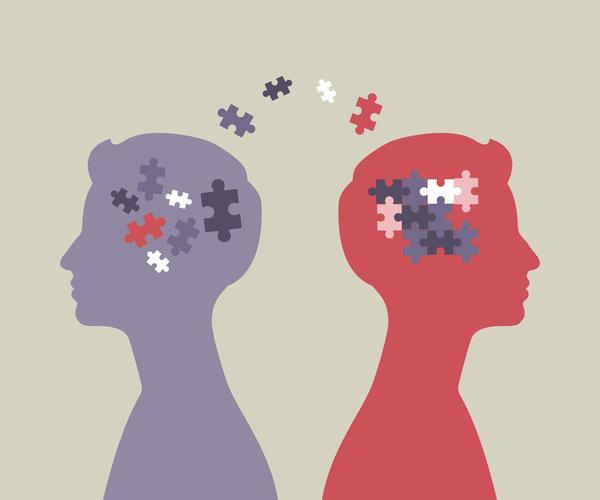Autism and Telepathy: Are "Nonspeaking" Children Actually Communicating?
What if nonspeaking autistic children aren’t silent at all — but are communicating telepathically or in other ways we don’t yet understand because science doesn't yet have the tools to measure?
That’s the provocative question explored in the new podcast The Telepathy Tapes, which follows scientists, parents, and children on the autism spectrum who allegedly share thoughts without speaking.
Of course there are innumerable skeptics who think the entire podcast is pseudoscience at best,
and a work of fiction at worst, by a documentary producer who has supposedly endorsed some fringe ideas. You can judge for yourself by listening to the podcase or waiting for the movie version to come out; supposedly it's in development.
Science Fiction — or the Future of Communication?
An Oregon-based scientist and medical doctor featured in the Telepathy Tapes podcast is studying cases
where nonspeaking children (once thought to be severely intellectually disabled) are actually very intelligent "spellers" (often able to communicate eloquently through typing letters into a tablet computer or other specialized assistive communication device — more on this later) AND (as now revealed by The Telepathy Tapes podcast) are able to read the minds of their parents and friends and even respond to mental questions before they are typed or
signed.
Some families who have children with this type of autism report shared emotional or sensory experiences that occur simultaneously, even across distances.
The doctor in Oregon is Dr. Diane Hennacy Powell, known for her work in the field of parapsychology. Her medical license at one point was suspended by the Oregon Medical Board due to her support for certain parapsychology claims.
Rethinking the Meaning of "Disability"
If these cases prove real (and it's unclear if science will ever be able to convince skeptics that they are real), the "disability" of being "nonspeaking" experienced by some children with severe autism may not be a disability at all. What we currently label as a communication deficit might instead be a form of enhanced awareness that bypasses traditional spoken language
entirely.
This idea is, of course, very controversial. Critics worry about false hope, pseudoscience, and parental projection.
Proponents argue that mainstream science has historically dismissed experiences it could not explain — from gut instincts to mirror neurons — until an explanation is "discovered."
The Rise of the "Spellers" Has Enabled This
Telepathic Revelation
Back to nonspeaking autistic children who are "spellers" — in recent years, many nonspeaking children once thought to be intellectually disabled have stunned their families — and the world — by demonstrating the ability to spell words, type full sentences, communicate complex thoughts, and even write complete autobiographies using tools such as letter boards, tablet computers, or other assistive communication devices.
Ignoring the telepathy issue, these breakthroughs made by spellers have destroyed long-held assumptions that silence equals cognitive limitation. A 2024 study led by University of Virginia psychologist Vikram Jaswal found that over half of a sample group of 31 nonspeaking participants with autistic demonstrated
knowledge of written language conventions, suggesting foundational literacy skills. This challenges previous estimates that fewer than 10% of people with congenital disabilities significantly impacting speech are literate.
Books such as Ghost Boy by Martin Pistorius — a man who was misdiagnosed as being in a vegetative state for years before revealing his intact mind — and Carly’s Voice, the memoir of Carly Fleischmann, a nonspeaking girl
with autism who became a gifted writer — show just how wrong these old assumptions can be.
Their stories are powerful reminders: Just because someone can’t speak, doesn’t mean they have nothing to say. And it is precisely the rise of this spelling technology — and with it the new ability of many children with the nonspeaking variety of autism who actually are able to communicate through spelling — that has allowed these nonspeaking
children with telepathic and other seemingly supernatural abilities to communicate these abilities. Before the advent of spelling boards, tablet computers, and other assistive communication devices, these telepathic abilities may have existed but were undiscovered because the children with these abilities had no way to communicate their abilities.
From Spiritual to Scientific
In earlier
decades, claims of telepathy were relegated to the paranormal, and still are by most mainstream science.
However, neuroscience is beginning to explore whether consciousness might be more than a product of neurons alone.
Research into quantum biology, synchronized brain states, and non-verbal communication may eventually offer measurable data.
What This Means for
Families
If you're a parent or grandparent of a nonspeaking autistic child, this movement may offer hope — but also caution.
Tools such as facilitated communication or RPM (Rapid Prompting Method) remain controversial and should always be evaluated with scientific scrutiny.
Still, the core message is profound:
What if
they’ve been trying to "talk" to us all along?
We believe every voice deserves to be heard — even those that don't speak in words. If you support a child with autism, we're here to help you navigate care, advocacy, and possibility.


